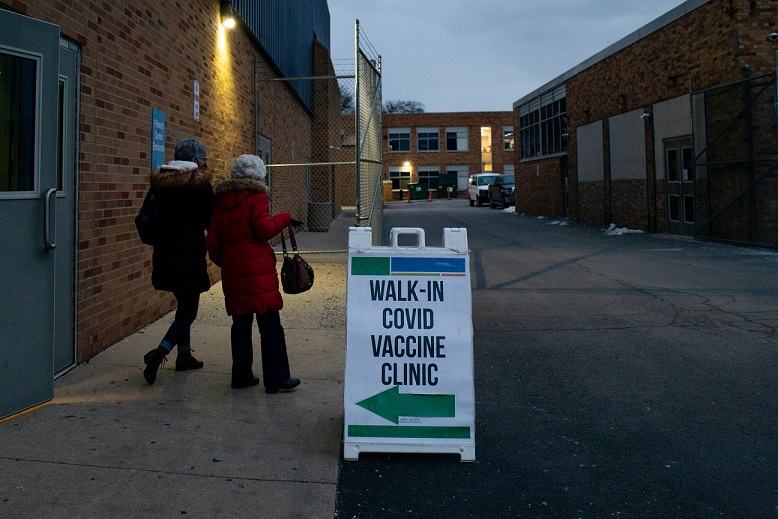According to multiple persons familiar with the proposal, the Biden administration intends to provide Americans age 50 and older the option of receiving a second dose of the Pfizer-BioNTech or Moderna coronavirus vaccine without explicitly suggesting that they do so.
Several uncertainties have clouded the decision, including how long the protection provided by a second booster would last, how best to communicate the plan to the public, and even whether the overall goal is to protect Americans against severe disease or from less serious infections as well, because they could result in prolonged Covid.
How severe the next wave of Covid infections will be will depend on when and how many people get infected. If the US is struck by a severe outbreak in the next few months, giving older Americans a second dose of the vaccine now may potentially save thousands of deaths and avoid tens of thousands of hospitalizations.
Additional vaccinations now, however, might turn out to be a problematic action that wastes vaccine doses, increases vaccination weariness, and causes uncertainty about the government’s plan if there is no large wave until later this autumn. However, despite the fact that the highly contagious Omicron subvariant BA.2 is contributing to yet another surge of coronavirus cases in Europe and is responsible for approximately a third of new cases in the United States, health officials do not expect a significant increase in cases caused by the subvariant in the near future.
There has been heated disagreement among federal health professionals about the best course of action, with some firmly in favour of a second booster immediately and others unconvinced. However, they seem to have come together on a proposal to provide an extra shot to everyone over the age of 50 in the event that infections spike again before the autumn. Americans of all ages, including those who had a booster injection last spring, should get another shot in the autumn, according to government authorities.
A second booster might be approved by the Food and Drug Administration as early as next week, according to numerous individuals familiar with the discussions at the agency. Following that, the Centers for Disease Control and Prevention would provide its own recommendations.
In most cases, a second booster will only serve as a temporary solution. There is widespread agreement among specialists that the present coronavirus vaccines need to be updated since the virus’s variations are reducing their effectiveness; the challenge is how to reconfigure them effectively. Whether it takes the shape of the Omicron variation, a subvariant such as BA.2, or a whole new lineage, a spike in the autumn is considered extremely plausible.
More than a dozen trials are under ongoing in an effort to discover the next generation of vaccinations, with the first findings due in May or June of this year. If all goes according to plan, it should give us ample time to create fresh dosages before the autumn. There is one big snag: according to the Biden administration, it does not have the funds necessary to reserve its position in line by paying vaccine makers for doses in advance of receiving them.
However, according to statistics from the Centers for Disease Control and Prevention, the Pfizer-BioNTech and Moderna vaccines continue to be around 78 percent effective against hospitalisation due to Covid-19 four to five months following a third injection. It’s possible that this is even an underestimation, given the study’s limitations.
According to the Centers for Disease Control and Prevention, Covid has already claimed the lives of one in every 75 Americans aged 65 and over, accounting for three-fourths of all Covid-related fatalities in the United States. More over 33 million individuals in that age bracket, or more than two-thirds, have had a first booster and would be eligible for a second if they met the requirements.
One official’s main concern is this: how far must the efficacy against hospitalisation decline before a second booster is warranted.
As it was last autumn, when the first boosters were deployed, the scientific community as a whole is split on what to do. The former top regulator at the Food and Drug Administration, Dr. Philip Krause, said in an interview that he was not convinced that the drug’s protection against serious sickness diminishes much after the third dosage.
There doesn’t seem to be anything in Pfizer’s or Moderna’s own statistics to back their demands for emergency authorisation; Pfizer is requesting second booster doses for individuals 65 and older, while Moderna has submitted an expansive application wanting to provide second booster shots for all adults. A randomised, placebo-controlled research, which is regarded to be the gold standard of scientific evidence, has not yet been conducted to determine how well the dosage would work in practise.
Vaccine specialist Dr. Peter J. Hotez, of the Baylor College of Medicine in Houston, stated, “We’re going to have to make this judgement on the basis of insufficient data.”

